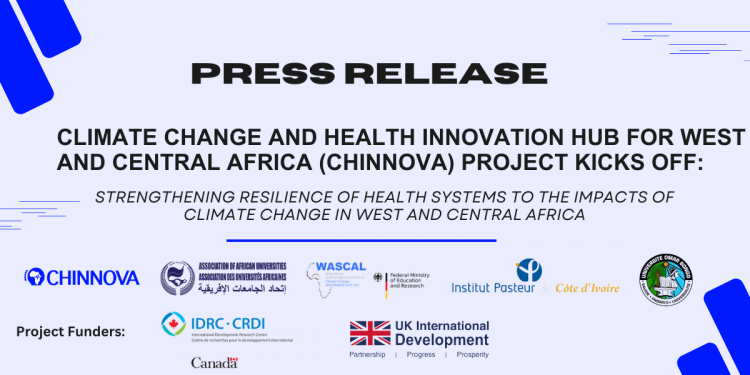Deadline: November 15, 2025
The CHINNOVA Small Grants for Climate and Health Innovation in West and Central Africa programme is now open for applications. This funding opportunity supports evidence-based, innovative projects addressing the intersection of climate change and public health across West and Central Africa. Selected organisations will receive funding to design and implement research or innovation projects that contribute to climate-resilient health systems.
About the CHINNOVA Small Grants Programme
The initiative is led by the Association of African Universities (AAU) under the Advancing Research for Climate and Health (ARCH) project. The programme seeks to strengthen research, policy, and innovation solutions centred on climate and health across African countries in the West and Central region.
- Maximum funding per project: Up to US $70,000
- Total available funding: Approximately US $700,000 to support 8–10 projects
- Project duration: Up to 18 months (2026–2027)
Projects must demonstrate strong innovation, regional relevance, ethical and gender-inclusive approaches, and the capacity to generate useful evidence for policy, systems strengthening, and/or community impact.
Eligibility Criteria
Organisations applying must:
- Be legally registered and headquartered in one of the eligible West or Central African countries.
- Be a research institution, university, NGO with a research component, or a public/private organisation working in climate-health.
- Apply as a multi-stakeholder consortium that includes at least one research institution and one civil society partner.
- Demonstrate previous research experience and capacity for financial and project management.
- Commit to ethical, inclusive, and gender-responsive research practices.
Eligible Countries
Benin, Cameroon, Chad, Cape Verde, Côte d’Ivoire, Democratic Republic of the Congo, Equatorial Guinea, Gabon, The Gambia, Ghana, Guinea, Guinea-Bissau, Liberia, Mauritania, São Tomé & Príncipe, Senegal, Sierra Leone, Togo.
Priority Research Themes
Proposals must focus on one or more of the following areas:
- Health systems preparedness for climate-related impacts such as floods, heatwaves, or extreme weather events
- Climate-health data systems, analytics, and interoperability
- Vector- and water-borne diseases (e.g. malaria, cholera) influenced by climate change
- Gender and social equity dimensions in climate-related health risks and outcomes
- Policy or institutional innovation to embed climate-health approaches into national or regional frameworks
Key Dates and Timeline
| Activity | Date |
|---|---|
| Call for applications opens | 9 October 2025 |
| Optional Expression of Interest | 25 October 2025 |
| Full proposal deadline | 15 November 2025 at 6:00 PM GMT |
| Notification of selected projects | January 2026 |
| Project start date | February 2026 |
Application Process
Applications must be submitted online via the official CHINNOVA Grants Management Portal. Required documents include:
- Full proposal
- Detailed budget
- CVs of lead investigators
- Letters of institutional support or partnership confirmation
Late or incomplete submissions will not be reviewed.
Tips for a Competitive Proposal
- Clearly demonstrate the climate-health problem your project addresses and why it is urgent in your country/region.
- Ensure your consortium reflects meaningful collaboration — research + civil society is mandatory.
- Include gender and equity considerations in design, data collection, participation, and outcomes.
- Provide a cost-efficient and realistic budget aligned with proposed activities.
- Highlight policy relevance, knowledge-sharing plans, and potential for scale or replication.
- Address ethics and required approvals early if your work involves human participants.
Why This Programme Matters
The CHINNOVA Small Grants for Climate and Health Innovation in West and Central Africa seeks to support local organisations generating new knowledge and solutions for climate-responsive health systems. Climate risks are already fuelling disease outbreaks, health emergencies, food insecurity, and systemic inequality. This programme strengthens African-led research, partnerships, and policy influence at a critical moment.
📌 Read more about the programme
contact us for proposal drafting, refinning and review

1 Comment
I’m interested